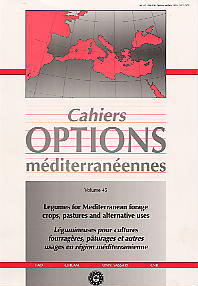| Article précédent | p. 435-438 | Article suivant |
Medicago arborea - a leguminous fodder shrub for low rainfall farming systems
Currently there are no suitable highly nutritious/palatable leguminous fodder shrubs for low rainfall calcareous soils of southern Australia. Preliminary evaluation of Medicago arborea has shown it has leaves with 20 per cent crude protein and 79 per cent digestibility. M. arborea has the potential to become a low rainfall zone fodder shrub in a similar way to the success of Tagasaste (Chamaecytisus proliferus) in the medium rainfall neutral acid soil zone. The agronomic and environmental benefits (alley farming and plantations systems to reduce wind and water erosion) of utilising M. arborea are being investigated. Trials will examine the grazing strategies, fertiliser requirements and plant densities needed to maintain productive plantations. M. arborea shows promise for the improved sustainability of fragile soils in low and medium rainfall farming systems in Mediterranean type environments.
- [ Afficher ]
- [ Télécharger ]
- [ Exporter la citation ]
Vous pouvez télécharger la citation au format :
- [ Imprimer ]
-
Mots-clés
MEDICAGO ARBOREA, PLANTE D'ABROUTISSEMENT, SOL CALCAIRECiter cet article
De Koning C.T., Duncan A.J. Medicago arborea - a leguminous fodder shrub for low rainfall farming systems. In : Sulas L. (ed.). Legumes for Mediterranean forage crops, pastures and alternative uses . Zaragoza : CIHEAM, 2000. p. 435-438. (Cahiers Options Méditerranéennes; n. 45). 10. Meeting of the Mediterranean Sub-Network of the FAO-CIHEAM Inter-Regional Cooperative Research and Development Network on Pastures and Fodder Crops, 2000/04/04-09, Sassari (Italy). http://om.ciheam.org/om/pdf/c45/00600238.pdf



